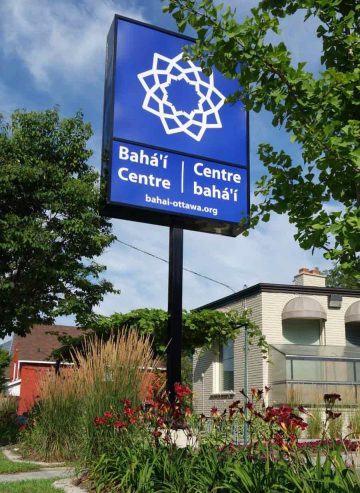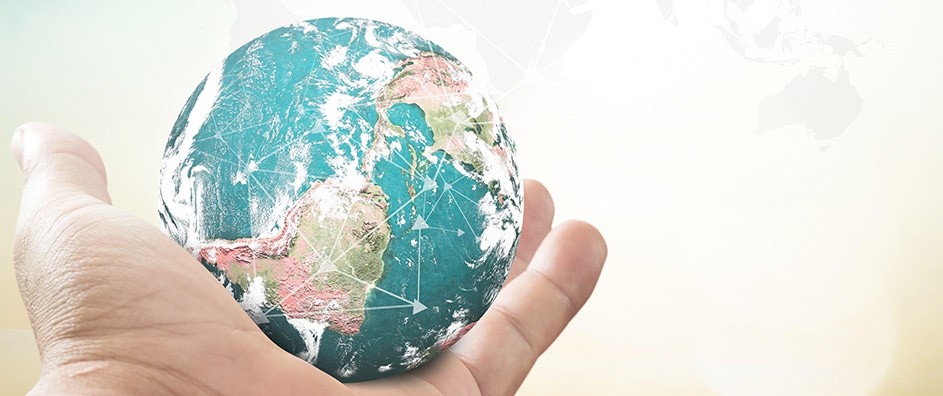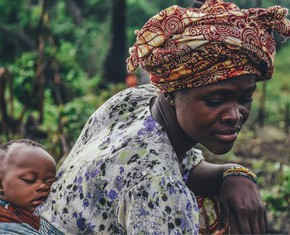The views expressed in our content reflect individual perspectives and do not represent the authoritative views of the Baha'i Faith.
Baha’is constitute a global community–but that’s no excuse for inaction when it comes to ecological stewardship or other facets of the common good.
Baha’u’llah, founder of the Baha’i Faith, urged us all to be “anxiously concerned with the needs of the age,” and naturally, questions of environmental awareness and action have taken on a growing importance for Baha’is as a result. In March of 2017, the stakes were raised. The Baha’is of the world received a letter from our elected international governing council, the Universal House of Justice. It called on Baha’is to consider how humanity can progress when narrow self-interest trumps the welfare of all; and to be mindful of how deeply our day-to-day economic decisions reflect our faith and affect our surroundings:
Humanity’s collective life suffers when any one group thinks of its own well-being in isolation from that of its neighbours or pursues economic gain without regard for how the natural environment … is affected … The teachings of the Faith leave no room for doubt: there is an inherent moral dimension to the generation, distribution, and utilization of wealth and resources. – The Universal House of Justice, March, 2017.
The challenge is obvious: to put into practical, daily terms what the Baha’i teachings say about “justice and generosity” and the creation of a peaceful global society. The Universal House of Justice wrote: “Every choice a Baha’i makes … leaves a trace, and … one’s economic decisions [must] be in accordance with lofty ideals.”
What are these ideals? Oh, not much–merely to be “a source of social good,” “the cause of peace and well-being, of happiness and advantage” to everyone around us! The Baha’i ethic of service is founded upon spiritual behavior, something little encouraged by our wider society. As the House of Justice points out:
The forces of materialism promote a quite contrary line of thinking: that happiness comes from constant acquisition,…that worry for the environment is for another day. These seductive messages fuel an increasingly entrenched sense of personal entitlement, which uses the language of justice and rights to disguise self-interest. – Ibid.
One of the most strongly-worded principles of the Baha’i teachings calls for the elimination of the extremes of wealth and poverty:
Each one of you must have great consideration for the poor and render them assistance. Organize in an effort to help them and prevent increase of poverty. The greatest means for prevention is that whereby the laws of the community will be so framed and enacted that it will not be possible for a few to be millionaires and many destitute. One of Baha’u’llah’s teachings is the adjustment of means of livelihood in human society. Under this adjustment there can be no extremes in human conditions as regards wealth and sustenance. – Abdu’l-Baha, The Promulgation of Universal Peace, p. 216.
Such growing disparity is one of the monstrous barriers that block our “transition from a divided world to a united one.” The ongoing development of the Baha’i administrative order, a remarkable instrument of consultative justice, is a wonderful achievement. However, the world’s Baha’is are still a relatively young community, and the House of Justice’s recent call for mindfulness of economic and environmental justice is addressed mainly to individuals, asking each person to find ways in their personal lives to apply the Baha’i principles of justice, equity and respect for the world of nature.

Baha’i Centre in Ottawa, Canada.
It is clear that the environmental impact of our choices is among the most critical dimensions of such personal daily decisions. For example, waste reduction and disposal, and the search for environmentally-responsible methods of beautification, have been key considerations in the development of our local Baha’i Centre on MacArthur Avenue here in Ottawa, Canada where I live.
The Ottawa Baha’i Centre has been in operation for over 10 years. Its programs of recycling, energy efficiency, avoidance of disposable dishware, and organic outdoor beautification have been quiet examples of the significance of material decisions made from a world-embracing, spiritual perspective. (For your interest, a detailed summary is here.)
In recent months, families and individuals have undertaken the following initiatives along similar lines of action. Many families, in their neighbourhood prayer meetings, have included ecological and social justice themes. One of our eco-warriors has spearheaded a major bike-share operation in the city. Another sponsored a talk–a superb introduction to the UN’s Sustainability Goals–by Victoria Thoresen, the chair of UNESCO’s program in sustainability education; she was in town for a United Nations conference, and we benefitted from her deep engagement and perspective. More recently, one early-adopting owner of an electric vehicle has formally proposed setting up a charging station in the Baha’i Centre’s parking lot, and the community is currently studying its feasibility. And so on!
But we don’t act alone. We have learned what many others understand: a critical element in creating resilient, sustainable societies requires forging ties among many community groups, regardless of their particular faith orientation (or the lack thereof). In our continual adoption of an outward-looking orientation, it may be that our growing, Baha’i-inspired network of connections with other groups and individual citizens is our most important work of all.
















Comments
Sign in or create an account
Continue with Googleor